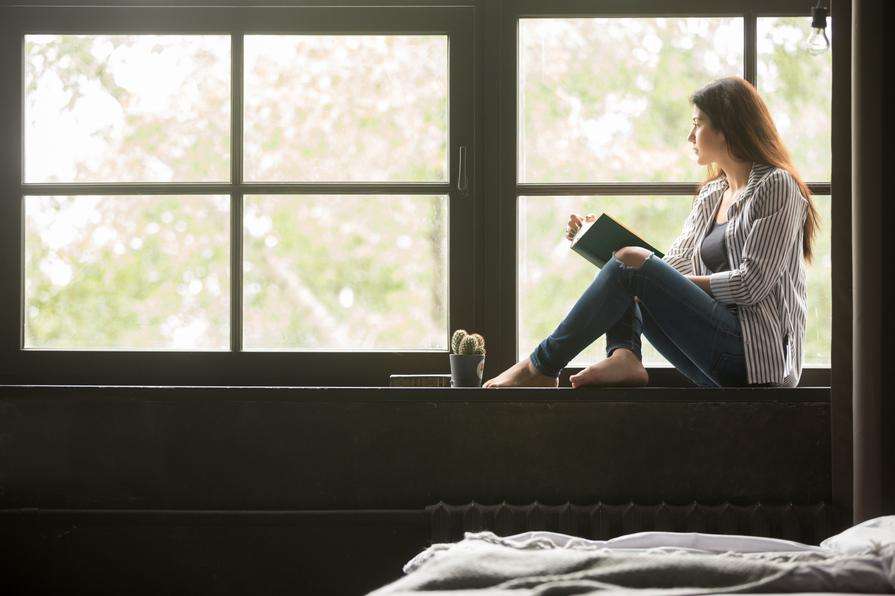Happy days are here again,
The skies above are clear again,
Let us sing a song of cheer again,
Happy days are here again….
Annette Hanshaw’s classic 1930 ditty could very well be the anthem for the survivors of the 2020 pandemic.
Face masks are coming off, vaccination rates are up, and people are walking around with an air of optimism, just in time for the Summer of 2021.
But, for some introverts, life became more transparent and straightforward during the pandemic.
The Pandemic of 2020 exposed the gaps in our lives with the accuracy of an electron microscope.
Many introverts have begun eating healthier, working out at home, and aligning with work that speaks to their highest aspirations.
So, what are we returning to?
And should we?
Sigal Samuel, a Staff Writer for Vox’s Future Perfect, said:
When I asked Vox readers if they were nervous about the return to normalcy, nearly 100 people responded with a resounding “yes.” They’re worried about the awkwardness of reacclimating to social life. They’re worried about returning to commutes and office work that added to their stress and chipped away at their quality of life. And they’re worried about returning to a new normal that looks much like the old normal — one whose flaws the pandemic threw into sharp relief (para. 3).
Extreme optimism about returning to the good old days may be shortsighted.
After all, we may have changed more than we realized. Generally, monumental change is incremental and takes place over some time.
Writer for Healthline, Scott Frothingham, reported that:
It can take anywhere from 18 to 254 days for a person to form a new habit and an average of 66 days for a new behavior to become automatic.
Given that we have been in crisis mode for over 365 days, it is safe to say that new habits have been permanently formed within many of us.
Considering the hypersensitivity of introverts, the solidification of new habits cannot be overstated.

Researchers and experts have consistently reported that introverts have fared better during the pandemic than extroverts.
However, there are no clear winners based on introverted versus extroverted personality types.
Psychologist Lis Ku of De Montfort University said:
Indeed, recent studies have found that introversion was predictive of more severe loneliness, anxiety, and depression after the circumstantial changes brought about by the pandemic. Extroversion, meanwhile, was correlated with lower levels of anxiety and a lower likelihood of experiencing mental health issues during lockdown… These results were further supported by a recent longitudinal study that followed 484 US college students through their 2020 spring term. As the pandemic progressed, introverts experienced increases in stress, while more extrovert students reported slight decreases in stress…Interestingly, the trend was reversed for positive mood: extroverts tended to experience a decline in mood during the early pandemic period, while introverts experienced a slightly improved mood (p. 1).
Dr. Ku further stated that extroverts used Zoom and social media to connect with the outside world, which assisted in staving off anxiety and depression.
Well-adjusted introverts fared well in solitude but may have been less content if confined with incompatible cohorts.
All this shows that many people discovered their best selves and created long-lasting habits during the pandemic.
What to expect in the ‘New Normal’ post-pandemic?
Let’s face it. Mindless and thoughtless people will dive headfirst into the pool’s shallow end and luxuriate on a rubber raft as they wade in the water.
Whereas reflective, thoughtful, and considerate people will take their time entering the pool to determine where the floor level changes.
These metaphors describe the approaches extroverts and introverts will experience as they move forward post-pandemically.
Additionally, post-pandemic sentiments have brought about philosophical shifts.
During the Pandemic of 2020, we experienced social and economic upheaval that gave us an up-close and personal view of human nature at its core.
Once you see reality in its pristine form, you can’t “un-see” it. The good and the bad.
These philosophical shifts will guide lifestyle choices as the “New Normal.”
For introverts, this translates into consistent and deeper silos and isolationist-oriented lifestyles.
Where introverts would have once asked, hypothetically, “If I could interact with people based on comfort and self-interest, how would that work?”
The pandemic answered that question.
The new question is, “Knowing the fickleness and shortsightedness of most people, how do I continue to interact with people based merely on core needs, goals, and values?”
Physical distancing opened up new opportunities for psychological distancing.
Whereas “Social Distancing” was a means of creating physical space for not contracting Covid-19, “Spatial Distancing” creates psychological boundaries to ward off personal intrusion and infliction with physical infrastructures.
Outdoor seating at restaurants, drive-in movies, and picnics in the park will persist in being logistical ways by which introverts experience the openness of life while moving people back through spatial distancing.
For introverts, the Pandemic of 2020 was a dry run for a new world.
Redesigned shopping malls, condensed office space, and online shopping will play strongly into the hands of introverts.
It changed an extroverted-centric world into an introverted one.
At least, it slid the scale closer to introversion than any time in the past.
For introverts, happy days are not here again. For them, a new day is dawning.
This day is better than those in the past.
For it gives balance to the social and psychological forces of nature.
And this is something to sing about.
—Robert Carroll

References
Frothingham, S. (2019, Oct. 24). How long does it take for a new behavior to become automatic? Healthline. Retrieved from: https://bit.ly/3plB8Fa.
Hanshaw, A. (n.d.). Happy days are here again. Lyrics. Retrieved from: https://bit.ly/3C6XaDg.
Ku, L. (2021, Apr. 12). Have introverts really fared better in lockdown? The Conversation. Retrieved from: https://bit.ly/3JSgGoR.
Samuel, S. (2021, May 12). We shouldn’t go back to “normal.” Normal wasn’t good enough. Vox. Retrieved from: https://bit.ly/3T1EkU2.


